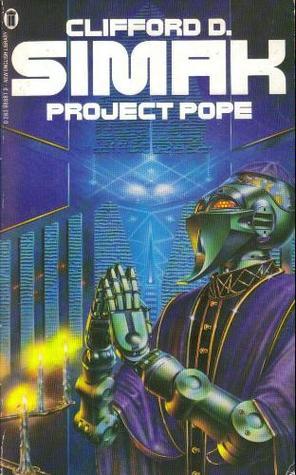A strong 3.5, cheekily rounded up to a 4.
Project Pope (1981) by Clifford D. Simak is a work of science fiction that weds philosophical inquiry to the classic themes of artificial intelligence and religion — a representative specimen from the author’s later, more contemplative period, when he had retired and was, let’s say... easing off the creative throttle.
The plot unfolds on the planet End of Everything (yes, that’s its name — subtlety is overrated), where a community of robots and monks (mostly of the cassocked variety) toils away at constructing the perfect, infallible Electronic Pope: an artificial intelligence intended to reconcile all spiritual truths of the universe. “Seekers”, humans endowed with psychic abilities, are dispatched to far-off worlds in search of religious wisdom to feed into the Pope’s ever-expanding database. All goes relatively well until one such Seeker returns claiming to have found Paradise. Naturally, this upends the fragile balance of faith and harmony surrounding the project.
Spoiler: the lady in question is clearly having a bit of a moment — particularly when some apparition wags a cosmic finger at her and mutters “naughty!” — but as with all religions, one mad prophet is often all it takes to spark a movement, and once the believers start piling in, good luck closing that door again.
To its credit, the book does grapple with some legitimate philosophical heft: What is truth? Can a machine comprehend or express the divine? Where, if at all, do science and faith intersect? (Spoiler alert: “Only in the fevered minds of the faithful.”)
As with much of Simak’s oeuvre, Project Pope is suffused with humanity and a quietly hopeful tone. His gaze — as also seen in City and Way Station — is one of compassion, gentleness, and reverence for man, nature, and the cosmos. His imagined worlds have that quintessentially “Simakian” vibe — somewhere between tranquil and mildly sedated — and though this is ostensibly science fiction, it’s more contemplative than kinetic. Think less pew-pew, more ommmm.
Of course, not everyone will be charmed. The “action” (such as it is) unfolds at a pace that might politely be described as glacial, which may test the patience of readers more inclined toward dynamic storytelling, laser battles, or blood-soaked alien carnage. Moreover, while the novel is rich in ideas, its characters can feel almost aggressively nice — to the point of one-dimensionality. But then, this is a novel of ideas, not people. The lack of tension or true danger renders it more a philosophical allegory (which it is, let’s be honest) than a dramatic narrative.
So yes, you’ve guessed correctly: Project Pope is not your typical sci-fi novel. It’s a utopian, metaphysical quest set in a curiously placid future. Recommended for those who favour philosophical science fiction and writers like Stanislaw Lem or Ursula K. Le Guin. It won’t scratch the itch for action or suspense, but if what you’re after is “deep thought in space”, it may be just the ticket.
3,5 που στρονκηλέβη (sic) σε 4
Το Project Pope (1981) του Clifford D. Simak είναι ένα έργο επιστημονικής φαντασίας που παντρεύει φιλοσοφικές αναζητήσεις με την κλασική θεματολογία της τεχνητής νοημοσύνης και της θρησκείας — ένα χαρακτηριστικό δείγμα της ύστερης, πιο στοχαστικής περιόδου του συγγραφέα, όταν έχει πάρει σύνταξη και παράγει τα εχμ… λιγότερο ενδιαφέροντα έργα του.
Η πλοκή τοποθετείται στον πλανήτη Εντ οφ εβριθινγκ, όπου μια κοινότητα ρομπότ και ανθρώπων (κυρίως καλόγερων) εργάζεται για τη δημιουργία ενός τέλειου, αλάνθαστου Ηλεκτρονικού Πάπα – μιας τεχνητής νοημοσύνης που θα συγκεράσει όλες τις θρησκευτικές αλήθειες του σύμπαντος. Οι "seeker", άνθρωποι με ψυχικές ικανότητες, ταξιδεύουν σε άλλους κόσμους αναζητώντας θρησκευτική σοφία για να την επιστρέψουν και να την ενσωματώσουν στη βάση δεδομένων του Πάπα. Ωστόσο, όταν μια seeker ισχυρίζεται πως βρήκε τον Παράδεισο, αρχίζουν να εμφανίζονται ρωγμές στην αρμονία και την πίστη του εγχειρήματος. Προφανώς και η μαντάμ έχει πάθει ντελούρι και δεν έχει βρει τον παράδεισο, ιδίως όταν στο παραλήρημά της ένας τυπάκος της κουνάει το δάχτυλο και της λέει «naughty!», αλλά όπως συμβαίνει με όλες τις θρησκείες, αρκεί ένας μουρλός για να δημιουργηθεί ρεύμα και μετά «δεν κλείνει η πόρτα».
Σϊγουρα το βιβλίο έχει ένα κάποιο φιλοσοφικό βάθος και εξερευνά υπαρξιακά και θεολογικά ερωτήματα. Τι είναι η αλήθεια; Μπορεί ένας υπολογιστής να κατανοήσει ή να εκφράσει το Θείο; Πού συναντιούνται επιστήμη και πίστη (spoiler alert «μόνο στο σαλεμένο μυαλό των πιστών»);
Ακόμη (όπως το σύνολο του έργου του Σίμακ) το «Project Pope», διαπνέεται από ανθρωπιά και ελπίδα. Η ματιά του συγγραφέα, όπως και σε άλλα έργα του (City, Way Station), είναι γεμάτη συμπόνια, με έναν ήπιο τόνο και σεβασμό προς τον άνθρωπο, τη φύση και το σύμπαν, ενώ ο κόσμος του είναι κλασικά Σιμακικός (κάπου μεταξύ αταράξ και λεξοτανίλ) ήρεμος για έργο επιστημονικής φαντασίας. Δεν βασίζεται στη δράση, αλλά στην ιδέα και τον στοχασμό, δημιουργώντας έναν «διαλογιστικό» ρυθμό αφήγησης.
Φυσικά, δε μπορεί να είναι όλοι χαρούμενοι. Η «δράση» (όση τέλος πάντων υπάρχει) προχωρά με πολύ αργούς ρυθμούς, γεγονός που ίσως αποθαρρύνει αναγνώστες που προτιμούν πιο δυναμική αφήγηση, «πίου πίου» λέηζερ, σφαγές, εκατόμβες εξωγήινων, κ.λπ. Επίσης, παρότι οι ιδέες είναι βαθιές, οι χαρακτήρες είναι σε κάποιες περιπτώσεις υπερβολικά «καλοί» ή μονοδιάστατοι. Άλλωστε, είναι έργο «ιδεών», όχι «χαρακτήρων», η δε απουσία αντιπαραθέσεων ή πραγματικών κινδύνων κάνει το κείμενο να μοιάζει περισσότερο με στοχαστική αλληγορία (που… είναι), παρά με δραματικό αφήγημα.
Ναι, καλά καταλάβατε. Το «Project Pope» δεν είναι ένα τυπικό μυθιστόρημα επιστημονικής φαντασίας· είναι μια ουτοπική, μεταφυσική αναζήτηση σε ένα απρόσμενα ήσυχο μέλλον. Προτείνεται σε όσους αγαπούν το φιλοσοφικό sci-fi και συγγραφείς όπως ο Stanislaw Lem ή η Ursula K. Le Guin. Δεν θα ικανοποιήσει όσους αναζητούν δράση ή αγωνία, αλλά είναι ιδανικό για αναγνώστες που ψάχνουν «βαθύτερο στοχασμό» μέσα από την επιστημονική φαντασία.

